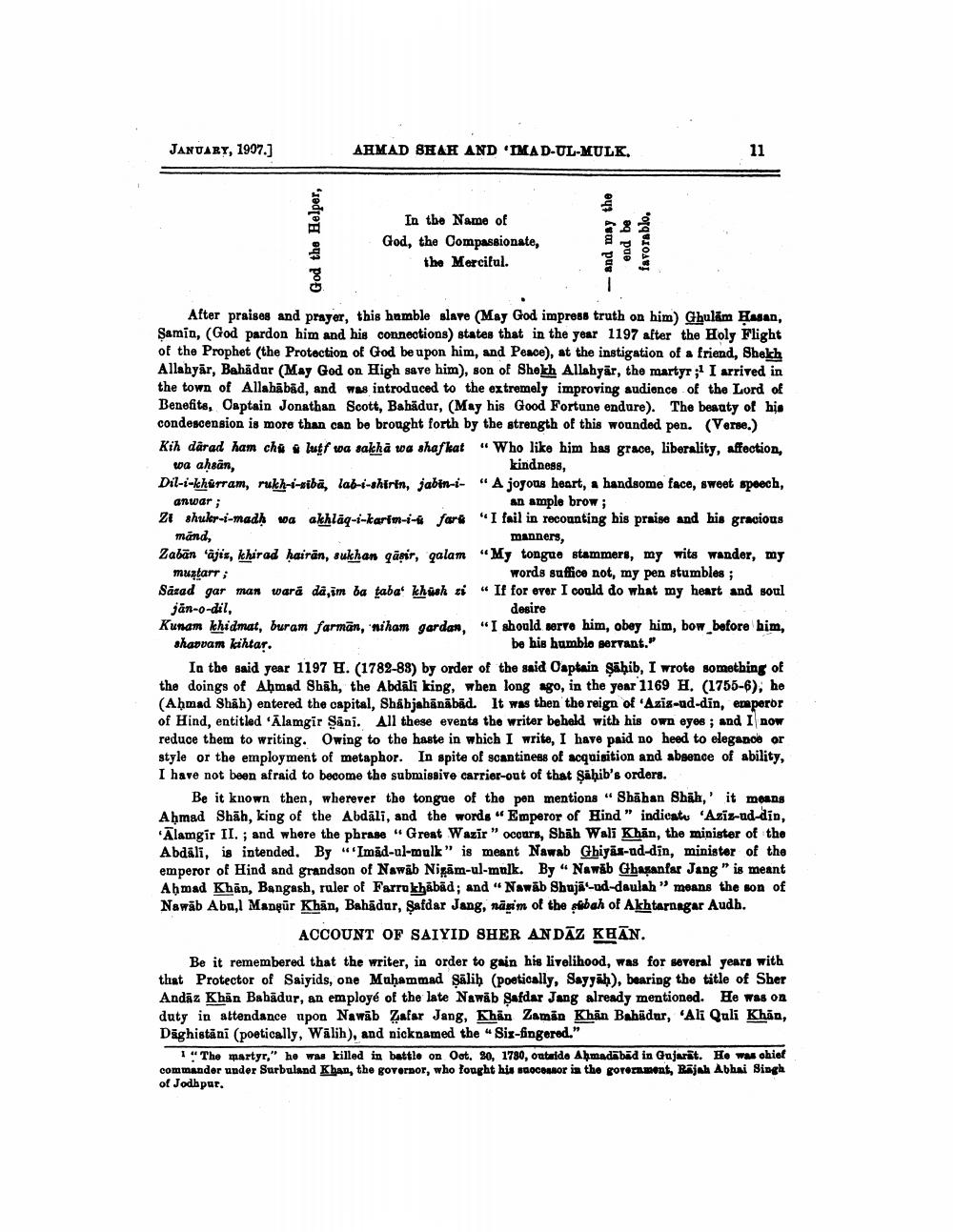________________
JANUARY, 1907.]
AHMAD SHAH AND TMAD-UL-MULK,
God the Helper,
In the Name of God, the Compassionate,
the Merciful.
and may the
end be favorablo.
After praises and prayer, this humble slave (May God impress truth on him) Ghulam Hasan. Şamin, (God pardon him and his connections) states that in the year 1197 after the Holy Flight of the Prophet (the Protection of God be upon him, and Peace), at the instigation of a friend, Shelch Allahyar, Bahadur (May God on High save him), son of Shekh Allahyār, the martyr ;' I arrived in the town of Allahabad, and was introduced to the extremely improving audience of the Lord of Benefits, Captain Jonathan Scott, Bahadur, (May his Good Fortune endure). The beauty of his condescension is more than can be brought forth by the strength of this wounded pen. (Verse.) Kih därad ham chalutt wa sakha wa shaf kat " Who like him has grace, liberality, affection, wa ahsan,
kindness, Dil-i-khürram, rukhu-kibā, lab-e-shirin, jabin-i- "A jogous heart, a handsome face, sweet speech, anwar ;
an ample brow; 21 shukr-i-madh wa akhlaq-z-karlm-- fara "I fail in recounting his praise and his gracious mand,
manners, Zabān 'àjis, khirad hairan, sukhan qāşir, qalam “My tongue stammers, my wits wander, my muztarr;
words suffice not, my pen stumbles ; Sasad gar man wara da, im ba tabar khush si “ If for ever I could do what my heart and soul jan-o-dil,
desire Kunam khidmat, buram farmān, niham gardan, "I should servo him, obey him, bow before him, shanvam kihtar.
be his humble servant." In the said year 1197 H. (1782-88) by order of the said Captain Sahib, I wrote something of the doings of Ahmad Shāh, the Abdali king, when long ago, in the year 1169 H. (1755-6), he (Ahmad Shab) entered the capital, Shabjahānābād. It was then the reign of 'Azis-ud-din, emperor of Hind, entitled 'Alamgir Sāni. All these events the writer beheld with his own eyes; and I ROW reduce them to writing. Owing to the haste in which I write, I have paid no heed to elegance or style or the employment of metaphor. In spite of scantiness of acquisition and absence of ability, I have not been afraid to become the submissive carrier-out of that Sahib's orders.
Be it known then, wherever the tongue of the pen mentions " Shāhan Shah,' it means Ahmad Shāh, king of the Abdāli, and the words “Emperor of Hind " indicatu 'Aziz-ad-din, Alamgir II. ; and where the phrase "Great Wazir" occurs, Shāh Wali Khăn, the minister of the Abdáli, is intended. By "'Imád-ul-mulk” is meant Nawab Ghiyas-ud-din, minister of the emperor of Hind and grandson of Nawāb Nigām-ul-mulk. By “ Nawab Ghazanfar Jang" is meant Ahmad Khān, Bangash, ruler of Farrukhābād; and "Nawāb Shuja -ud-daulah " means the son of Nawab Abal Manşūr Khān, Bahādur, şafdar Jang, nāsim of the çmbah of Akhtarnagar Audh.
ACCOUNT OF SAIYID SHER ANDĀZ KHĀN. Be it remembered that the writer, in order to gain his livelihood, was for several years with that Protector of Saiyids, one Muhammad sālih (poetically, Sayyah), bearing the title of Sher AndĀz Khan Babădur, an employé of the late Nawab Safdar Jang already mentioned. He was on duty in attendance upon Nawāb Zafar Jang, Khin Zaman Khan Bahadur, 'Ali Quli Khan, Daghistani (poetically, Wālih), and nicknamed the "Six-fingered."
1 "The martyr," he was killed in battle on Oct. 20, 1780, outaido Ahmadabad in Gujarat. He was chief commander under Surbuland Khan, the governor, who fought his saoconsor in the government, Rajah Abhai Single of Jodhpur.




